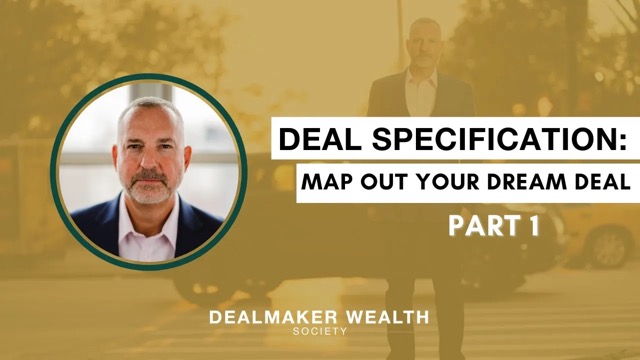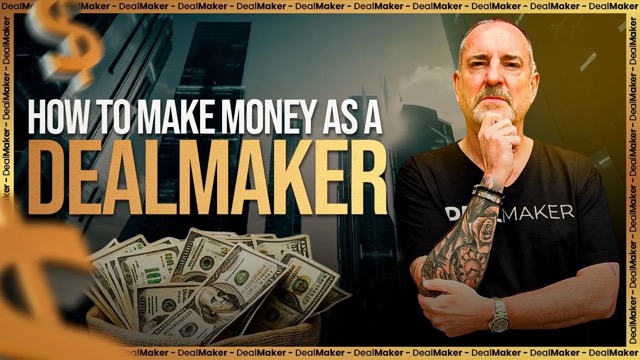Deal Specification: What role do you want to play in the business?
Deal Specification: What role do you want to play in the business?
In this in-depth video, Carl Allen expands on the critical role your skills, time, and sector knowledge play in shaping your dream business acquisition strategy. Building on the concept of the Dream Deal Specification (DDS), Carl walks you through how to define the exact role you want to play in your business—whether it’s as a hands-on operator or a remote chairman. He shares how to align your skills and weaknesses with your team, develop strong reporting systems, and choose a sector you either know well or can access through strategic partnerships. You’ll also learn how to build credibility with sellers and financiers, even if you’re young or transitioning into a new industry.
Carl reinforces the importance of passion—your internal engine—as the key to overcoming the inevitable challenges of business ownership. He shares real-world examples of buyers who found their sweet spot by combining market insight, past experience, and genuine interest into a single niche. Whether you’re acquiring your first company or expanding your portfolio, this training provides a proven blueprint to make smarter, faster decisions. And if you’re ready to go even deeper, Carl invites you to his free 90-minute masterclass where he reveals the 10-step system for acquiring profitable businesses using none of your own money.
Full Transcript:
Welcome to this YouTube channel on how to buy businesses no cash down. I’m Carl Allen, and I’ve been buying businesses for almost twenty five years, more than two hundred and fifty deals in seventeen countries.
This playlist is all about deal specification.
So what type of business do you want to buy? The sector, location, the size of the deal, your desired role in the business, and how you bring your passion, your business skills, and experiences to bear. Here’s the next video in the sequence. There are five in total.
The next aspect of the DDS is role. Now your answers to the previous questions will help you define this.
But helping you with the decision further, think of role as having two components. The first is skill based, and the second is time based, linking both work life balance and location from earlier.
Now let’s do time first as this is still fresh in our minds. If you don’t want to work full time in your business or at least four days a week, then you need to be more of a chairman than general manager. Therefore, it’s important that you acquire a business with a good existing management team. Or if it has weaknesses or gaps in it, use the funding that you will raise in step five of the system to hire new and better people.
Also, from earlier, I want to reemphasize the need for good reporting systems so you can monitor the business remotely when you’re not there. Most of the businesses you go see will not have any good systems or processes, especially if the seller is the burned out owner manager, so you’ll need to develop them. In my businesses, I have a series of dashboards, which is sent to me daily daily for cash flow, weekly for sales, profits, and other key metrics. Then there are monthly management packs that we use in our board meetings. What’s great is if you get this right, your ability to own multiple businesses and start building a portfolio is quite high.
I said the other role was skills. This is more relevant if you are going in there full time. We all have skills even if they are not obvious. Mine are sales, marketing, strategy, and finance.
I don’t know much about HR, operations, supply chain, sourcing, etcetera. So I make sure I have strong people in my businesses that are superstars at that kind of stuff. I wouldn’t say I don’t know anything about these areas, but I’m definitely not an expert. If you’re going into a business full time, it makes sense for you to leverage your own key skills.
Not necessarily in doing, but being able to direct and manage the employees to do things the way you know best. Also, just be honest on what your weaknesses are. It’s really important. You can’t be great at everything.
If you have weaknesses, just make sure they are either strong people in those functions inside of the business or you quickly go out and hire them with the funding that you’ll generate.
The next factor to consider is sector knowledge, and this is also really important.
Now on your first deal, I recommend you acquire a business that’s in a sector you know and you understand. It’s so much easier to build trust, credibility, and rapport with the two most important people in this process, the seller and the financier. The seller wants that safe, trusted pair of hands. And if you’ve got no clue about the sector whatsoever, it’s going to weaken your argument for taking the business forward.
Likewise, financiers will have the same view. Now it’s important to remember, the financier is not lending you the money like a mortgage company or a home loan business will do when you buy a house. They are lending the money to the business, but will want a good, credible person as leader and custodian over the business and their investment. Investment.
Now if you really want to acquire a business in the, say, technology sector, yet you’ve spent your career in, say, retail, use that retail angle as part of your growth strategy, I. E. You see a big on top market for selling the technology widget, whatever it is, direct to the customer through a retail channel or whatever strong argument or hook that you can generate. If you’ve got no angle or hook, it’s important then that you partner up with someone that can lend you some market relevance.
A consultant, for example, can teach you all you need to know to be credible and even ask that the consultant be part of your board or ownership structure to lend weight to your finance proposal. Even giving the consultant, say, fifteen or twenty percent of the business for all the work that he or she is going to do for you kills two birds with one stone. Means you don’t have to pay them. It gives you market acceptance in front of the seller and also boosts your market credibility with financiers.
Now this really young guy watched my free webinar last month, and he wanted to join the program. But he asked me upfront, how will sellers and financiers react to him as a twenty two year old person fresh out of college? And I was pretty honest with him. I said, look.
You know, I recommend that you go out and partner with someone who’s older, that’s got some sector experience, and what I call, you know, gray hair. They’ve had years on earth and can lend that experience, that noise, that credibility to him and his deal. And it makes both the seller and the financier more comfortable with you if you’re very young and very inexperienced. It’s really important.
Now in terms of sector knowledge, you just need a hook. I once acquired a website business, but knew nothing about the market. Yet, because I worked for HP, which had nothing to do with websites, but was a prominent technology company in general. I built amazing trust, credibility, and rapport with both the seller and the finances I used to do the deal.
Now you need to develop similar hooks. And although you can’t fabricate any of your own experience, just look for ways to spin what you’ve done before and why that can be legitimate and relevant to the business market or niche that you’re approaching. And what’s great about business in general is everything mapped back to between eight or ten overarching industry sectors. I’ve left out agriculture, as a topic here, although it could still be relevant if that’s your market.
But the eight primary industries that I focus on are information technology, telecommunications, manufacturing, engineering, retail, whether that’s in stores or online, professional services, so legal firms, accountancy firms, etcetera, business services, websites, storage services, everything like that, PR, HR businesses, and then the general business to consumer sector, again, whether that is through distribution, through the Internet, through stores, etcetera.
So virtually every business opportunity that you will originate will map back to one of these primary sectors. The key on your first deal is try to stay in your own lane.
So next up is business experiences, and it’s about how your career to date will influence what type of business you acquire.
Now let’s look at this in three ways. First is sectors that you can take advantage of. Now this goes back to your sector knowledge. What trends are occurring in your primary sector of knowledge that you can take advantage of?
A good example is what one of my clients did in the aerospace sector. Now this is a massively complex sector with a complex supply chain. There are more than two million components in, say, an Airbus passenger plane, and this small five million dollar business that my client acquired did a handful of these parts. Now what was happening in the supply chain was mass consolidation.
Larger engineering firms wanted the smaller businesses to combine the parts themselves and collectively deliver the combined units of them. So my client acquired a small business doing just a part of that and then set up joint ventures with others around him to take in their parts, consolidate, and sell on that combined together unit. It worked really, really well. It was a good addition to the service model, and it was able to charge a much higher price and make more profit.
This is just one example. What you need to do is know your industry or research it properly to know what pain the customer has or what you can do differently in your new business. So second are standards. Standards, legislation, and regulation.
Virtually, all businesses are governed in some way by some or all of these. What’s changing in your primary business sector, and what can you take advantage of? Another client of mine acquired a construction company in France several years ago because the government in France was about to pass a law regarding more stringent standards on asbestos removal. The stuff’s everywhere in France.
My client went in, acquired a business that wasn’t doing any asbestos removal, got a license very quickly, and then went out and he made an absolute killing doing asbestos cleanup work in the French market.
Finally, look at your past experiences and try to map together what you are passionate about to what your end user market truly needs. Another client of mine sold complex and expensive IT storage equipment to the government sector and absolutely hated it, hated the bureaucracy, the politics, the long sales cycle, but he loved the storage offering in general for small business owners. It was cheap to set up, cheap to deliver online, quick to deliver online, very, very short sales cycles. A few days to win the business versus a few years going into big central governments. There were no politics, and he could even use social media to market the offerings. That’s what he was really passionate about, and that’s what he did.
Next, we’ll look at how you can leverage your existing business network. We’ll get into this in more detail next week in origination, but this is all about giving you the weapons for when you own the business and will trade in the market. What will really give you an advantage in your business is a ready made network to trade with. Do you have customers that you already know or sell to that will follow you into this new venture? Same for suppliers. For everything you need to build your products or services, can you call on partners like distributors, financiers, importers, and exporters if you trade in cross border? And even better, can you build joint ventures with these businesses?
If you’re going to acquire, say, an IT hardware business and you have a potential partner who sells software, can you create a JV and cross sell your products and services to each other?
Last but not least, let’s talk about passion. It’s the fuel to keep you on track no matter what life and your primary market throw throw at you. Now what you need to do is create the best expertise passion combination. From all the work we have just done, you will know by now where your experience and passion truly are.
The key is to drill down into your primary market and find the niches where you can have the best of both worlds. For example, the IT storage story is a perfect example of this. As this is an example in manufacturing, you may have a low passion for manufacturing in general and know the market reasonably well. Electronic components, you are more passionate about.
And then drilling deeper into the automotive sector is something you’re both really passionate about, and you know the market in more detail. So that would be an example of a perfect expertise passion combination. This can be a very, very long list of ten, fifteen, twenty, even fifty combinations, or it could be a very short one, less than five.
So that’s it for this particular video. The next video in this playlist will follow, and please check out all the other playlists and videos for everything you need to know to learn how to buy a business no cash now. In fact, I’ve crammed everything that you need to know into a special ninety minute webinar titled three insider secrets to buy a profitable business inside of ninety nine days without cash or knowing how to run a business. And here are the three big secrets, the three killer training topics. Think of these as hurdles to you becoming a business owner. First, I’ll show you exactly what the ten steps are to buy a business, and you must follow these in order. It’s really critical.
Second, I’ll show you lots of case studies of deals structured using OPM, other people’s money, and it’s no more difficult than high school math. And finally, I’ll show you how you can get others to operate the businesses for you so you can do other things like spend time with your family or buy other businesses whilst enjoying the cash flow that your new business is generating for you. So to register for this groundbreaking training, just click on the link underneath this video on YouTube or type in this link into your browser. It’s b I t dot l y forward slash buy hyphen my hyphen business. And I’ll see you on air sometime in the next week. Until then, bye for now.




